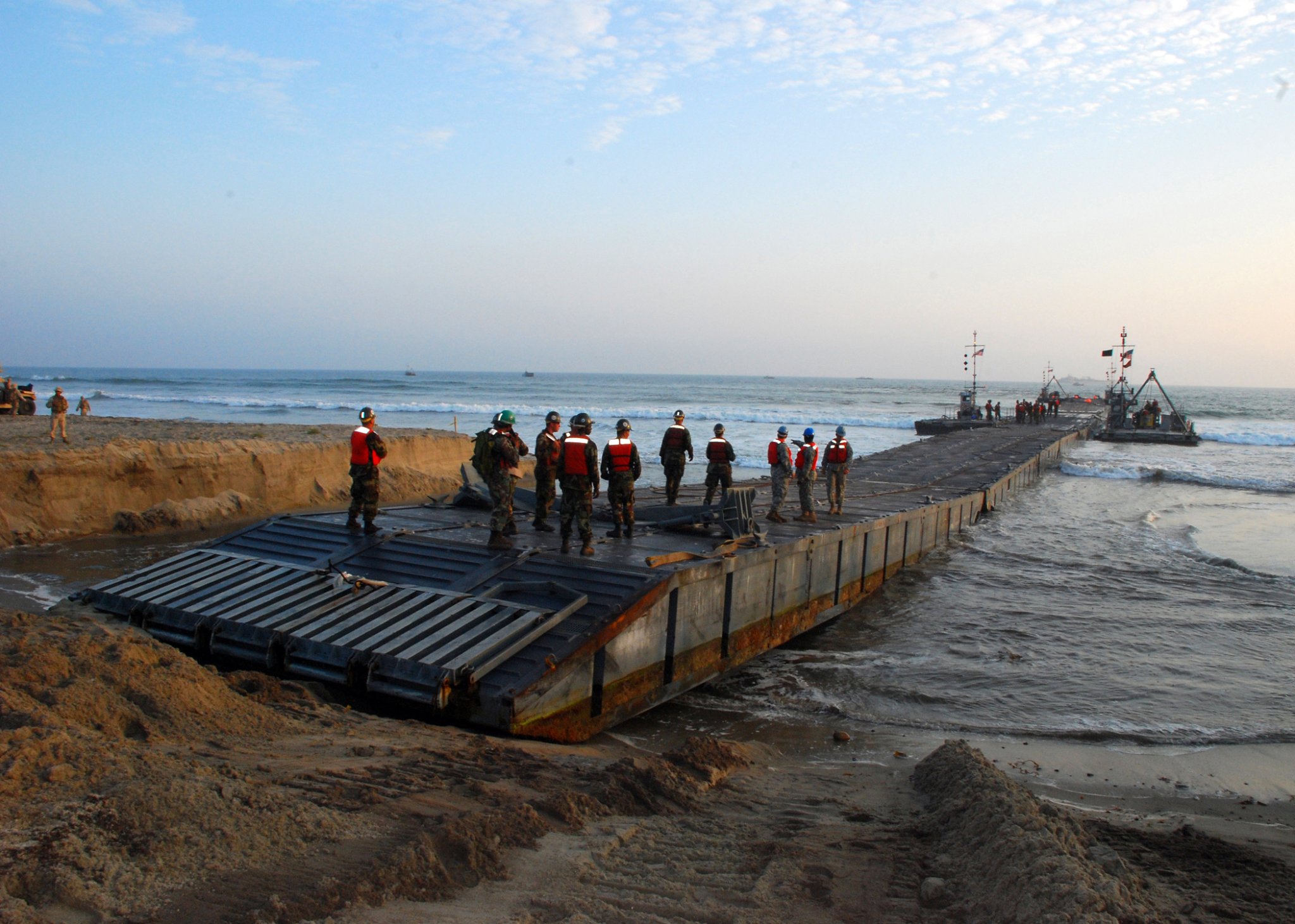

The U.S. military’s temporary pier off a Gaza beach was damaged in rough weather Saturday, temporarily suspending the delivery of humanitarian aid and briefly stranding U.S. boat crews aboard tender vessels run aground, the Pentagon said.
The U.S. military’s Joint Logistics Over The Shore, or JLOTS, pier officially began operations last week. The pier was constructed with the intent of providing more critical aid in a humanitarian crisis brought on by the Israel-Hamas war, which began after Hamas attacked Israel on Oct. 7.
“Four U.S. Army vessels supporting the maritime humanitarian aid mission in Gaza were affected by heavy sea states, causing these motorized pier sections which are used to stabilize the Trident pier to break free from their anchors due to a lapse in power and subsequently beach ashore,” Pentagon spokesperson Sabrina Singh said Tuesday.
The day after the briefing, Singh said that there were U.S. personnel aboard four Army vessels that washed up onto beaches in Israel and Gaza. Troops abroad the vessels were evacuated on Saturday, May 25 — the same day that the vessel broke apart.
Two of the Army vessels that broke free were beached on the coast of Israel near Ashkelon. One has been recovered and the other will be recovered in the next 24 hours, Singh said.
The remaining two vessels that were beached near the Trident pier are expected to be recovered in the next 48 hours with help from the Israeli Navy. Over the next two days, the pier anchored into the shores of Gaza will be removed and towed to Ashdod for repairs by CENTCOM officials, Singh said.
“There was an unfortunate, unique pattern of events with high seas and another storm that came in that caused the JLOTS to become inoperable during that time,” Singh said.
Some U.S. aid in Cyprus is already being loaded onto vessels so when the pier is re-anchored, aid is prepositioned for roll-off “immediately,” she said.
“The rebuilding and repairing of the pier will take at least over a week and following completion will need to be re-anchored to the coast of Gaza,” Singh said. “Upon completion of the pier, repair, and reassembly, the intention is to re-anchor the temporary pier to the coast of Gaza and resume humanitarian aid to the people who need it most.”
The JLOTs setback is the latest problem for the pier project which has already resulted in three U.S. service member injuries – two minor and one who remains in critical condition. The temporary pier was announced after international humanitarian air drops resulted in several fatalities and as on-the-ground aid convoys continue to be restricted.
Since aid began flowing through the pier Friday, more than 1,000 metric tons of humanitarian supplies have been delivered to the marshaling area for distribution to Gazans by humanitarian organizations, Singh said. In early May, CENTCOM said that the U.S. had dropped nearly 1,220 tons of humanitarian assistance to date.
According to USAID, American-provided aid packages include nutrient-rich food, plastic sheeting for shelter, jerry cans to hold clean water, and hygiene kits.
Subscribe to Task & Purpose today. Get the latest military news and culture in your inbox daily.
“This humanitarian maritime corridor alone is not enough to meet the staggering needs in Gaza, but it is an important addition. It is meant to augment, not replace or substitute for land crossings into Gaza,” said Daniel Dieckhaus, Director, U.S. Agency for International Development’s Levant Response Management Team at a Pentagon briefing Friday.
Over the past two weeks, less than 100 aid trucks have entered Gaza daily which is “far less than the 600 needed every day to address the threat of Famine,” USAID officials said in a release.
Last week, officials noted security concerns with the aid distribution including “potential looting along a prearranged distribution route” and a recent Hamas drone attack on the IDF which led “to the temporary shutdown of humanitarian convoys around Gaza for safety reasons,” Vice Admiral Brad Cooper, Deputy Commander, United States Central Command said Friday.
While the U.S. has promised no boots on the ground in Gaza, Israeli media outlets have shared photos of U.S. service members on Israeli beaches where a vessel washed ashore as far north as Ashdod, a city in Israel roughly halfway between the Gaza Strip and Tel Aviv.
The JLOTS concept isn’t new for the U.S. military. In 2023, the Army used JLOTs in an international exercise with Australia called Talisman Sabre to practice military logistics in the event of conflict in the Asia Pacific region. Soldiers also deployed a JLOTS pier to deliver humanitarian supplies to Haiti in 2010.
UPDATE: 5/29/2024; This article has been updated with a statement from Pentagon spokesperson Sabrina Singh.
The latest on Task & Purpose
- Married Marines graduate from Parris Island boot camp together
- USS Carney had ‘seconds’ to respond to anti-ship ballistic missiles
- 18th Airborne Corps orders soldiers on staff duty to get some sleep
- Bud Anderson, the last World War II ‘triple ace,’ dies at 102
- Air Force general will jump from one to three stars to lead air commandos
